Expert Interviews
- University Reviews
- Career Guide
 Video Counseling
Video CounselingImportant Facts
- Ask any Question - CV Forum

Engineering Courses:Colleges, Exams, After 10th/12th/Diploma
College Vidya Team Jan 11, 2025 5.8K Reads

Engineering courses are educational programs that focus on the principles, practices, and technologies involved in designing, building, and maintaining various types of machines, systems, and structures. These courses usually cover a wide range of topics, including mathematics, physics, chemistry, computer science, and engineering design.
Latest Update: Class 10th and 12th CBSE Board Results of the year 2024 are Soon to be released, to check the result you have to visit the official website of the CBSE, and for more details Click Here.
Engineering courses can be pursued at various levels, from undergraduate to postgraduate and doctoral programs. This blog is a detailed guide to engineering courses in India. Know everything that is there to learn about the same, but first let us understand what engineering really is and if it is something you should pursue or not.
What Is Engineering?
Engineering is a branch of science and technology that involves the design, development, construction, and maintenance of various systems, structures, machines, and devices. Engineers use their knowledge of mathematics, physics, and other sciences to solve practical problems and create innovative solutions.
The field of engineering is broad and diverse, encompassing many specialised areas, such as civil engineering, mechanical engineering, electrical engineering, chemical engineering, and biomedical engineering, to name a few. Each of these areas focuses on different aspects of engineering and requires a unique set of skills and knowledge.
Engineers play a vital role in shaping the world we live in, from designing buildings, roads, and bridges to developing new technologies for medical treatments, transportation, and communication. They work in a wide range of industries, including aerospace, automotive, energy, construction, and electronics, among others.
To become an engineer, one typically needs to complete a degree program in engineering, which can take anywhere from three to five years or more, depending on the level of study. Many engineering programs require students to take courses in their chosen field.
|
People Also Ask |
|
Overall, engineering is a fascinating and challenging field that offers many opportunities for creativity, innovation, and problem-solving. It’s a field that requires a strong foundation in mathematics and science, as well as excellent critical thinking, communication, and teamwork skills.
Which Engineering Course is the Best?
It’s difficult to say which engineering course is the “best” as each field has its own unique set of challenges, opportunities, and benefits. The best engineering course for you may depend on your individual interests, skills, and career goals.
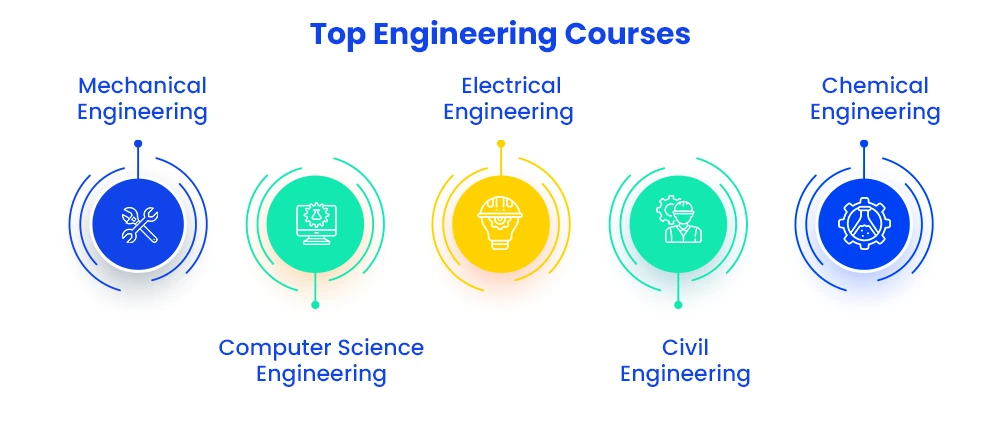
Here are some of the oldest, prestigious, and most popular engineering courses:
- Mechanical Engineering- deals with the design and manufacturing of mechanical systems and machines.
- Electrical Engineering- deals with the study and application of electricity, electronics, and electromagnetism.
- Civil Engineering- deals with the design, construction, and maintenance of infrastructure such as buildings, roads, bridges, and water systems.
- Chemical Engineering- deals with the design and development of chemical processes and equipment.
- Computer Science Engineering- deals with the design and development of computer systems and hardware.
There are so many other domains and sub-domains that are out there. It is important to do your own research and consider your personal interests and goals when choosing an engineering course. To help you make an informed decision for your career, we have compiled a precise guide to engineering courses.
Engineering Course Subjects/Syllabus
The syllabus of engineering courses may vary depending on the specific program and institution. However, in general, engineering courses cover a range of topics related to science, technology, mathematics, and engineering principles. Some common subjects that are typically included in engineering syllabi are:
- Mathematics: Calculus, differential equations, linear algebra, probability and statistics.
- Physics: Mechanics, thermodynamics, electromagnetism, and optics.
- Chemistry: Basic principles of chemistry, chemical thermodynamics, and chemical kinetics.
- Computer Science: Programming, data structures, algorithms, software engineering, and computer architecture.
- Engineering Design: Engineering drawing, modelling and simulation, and design thinking.
- Mechanics: Statics, dynamics, mechanics of materials, and fluid mechanics.
- Materials Science: Properties of materials, behaviour of materials, and processing of materials.
- Electrical and Electronics Engineering: Circuit analysis, signals and systems, electronics, and digital logic design.
- Control and Instrumentation: Control theory, instrumentation, and measurement systems.
- Renewable Energy: Solar energy, wind energy, hydro energy, and biomass energy.
These are just some of the topics that might be included in an engineering course syllabus. The specific courses and topics covered will depend on the engineering program and the institution offering the course.
Given in the table below are the links to the detailed syllabus of top specialisations in Engineering:
25+ Engineering Courses List
Given below is an extensive list of the major engineering disciplines that are offered in India:
|
Aerospace Engineering |
Agricultural Engineering |
|
Automobile Engineering |
Biochemical Engineering |
|
Biomedical Engineering |
Ceramic Engineering |
|
Chemical Engineering |
Civil Engineering |
|
Computer Science Engineering |
Electrical and Electronics Engineering |
|
Electronics and Communication Engineering |
Environmental Engineering |
|
Food Processing and Technology |
Genetic Engineering |
|
Industrial Engineering |
Information Technology |
|
Instrumentation and Control Engineering |
Marine Engineering |
|
Materials Science and Engineering |
Mechanical Engineering |
|
Metallurgical Engineering |
Mining Engineering |
|
Nuclear Engineering |
Petroleum Engineering |
|
Polymer Engineering |
Production Engineering |
|
Textile Engineering |
|
Please note that this is not an exhaustive list, and there may be other specialised programs or sub-disciplines that are not included in this list because new programs are constantly being added. Also, the availability of these programs may vary from institution to institution.
Engineering Courses After 12th
There are numerous engineering courses that one can pursue in India after completing 12th standard. 10 of the most popular engineering courses after 12th are:
- Bachelor of Technology (B.Tech)
- Bachelor of Engineering (BE)
- Bachelor of Science (B.Sc) in Engineering
- Bachelor of Computer Applications (BCA)
- Bachelor of Information Technology (BIT)
- Bachelor of Science (B.Sc) in Information Technology
- Bachelor of Science (B.Sc) in Computer Science
- Bachelor of Science (B.Sc) in Electronics & Communication Engineering
- Bachelor of Science (B.Sc) in Mechanical Engineering
- Bachelor of Science (B.Sc) in Civil Engineering
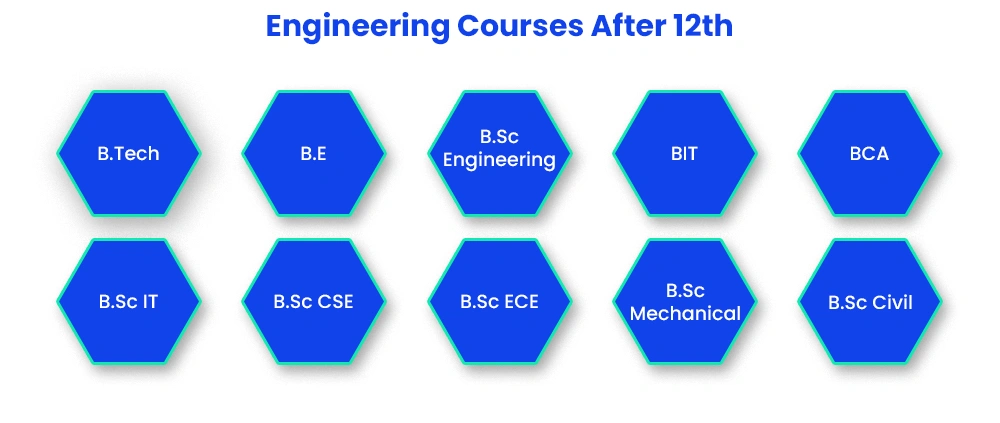
In addition to the above mentioned courses, there are many other specialised engineering courses as well, such as petroleum engineering, aerospace engineering, biomedical engineering, chemical engineering, and many more. The admission criteria, course duration, and curriculum may vary depending on the course and the institution.
|
You May Interested |
|
Engineering Courses After Diploma (Lateral entry)
It depends on the type of diploma you have and the specific engineering course you want to pursue.
If you have a diploma in engineering, such as a Diploma in Mechanical Engineering or a Diploma in Electrical Engineering, then you may be eligible to pursue a Bachelor of Engineering (BE) or Bachelor of Technology (B.Tech) course in the same or related field.
However, if you have a diploma in a non-engineering field, such as a Diploma in Business Management, then you may not be eligible for certain engineering courses.
In India, the eligibility criteria for admission to engineering courses vary depending on the state and the institution. Generally, to pursue a B.E. or B.Tech. course, you must have completed 10+2 or its equivalent examination with Physics, Chemistry, and Mathematics as core subjects.
However, if you have a diploma in engineering, then you are eligible for lateral entry admission to the B.E. or B.Tech program. Lateral entry means that you get admission directly into the second year of the BE/B.Tech program. This makes the course duration only 3 years.
In short, you can pursue all the engineering courses that are there after 12th standard provided that your diploma is in a relevant subject and that you meet the eligibility requirements.
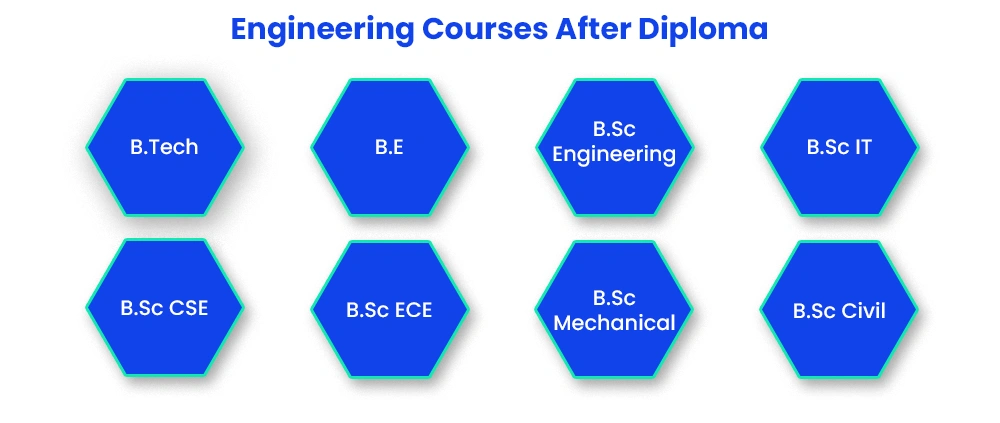
Following is the list of the popular engineering courses after diploma in engineering:
Engineering Courses After Graduation
There are various engineering courses after graduation that you can pursue once you have completed your bachelor’s degree. Following are all these master’s degree courses in engineering that are out there:
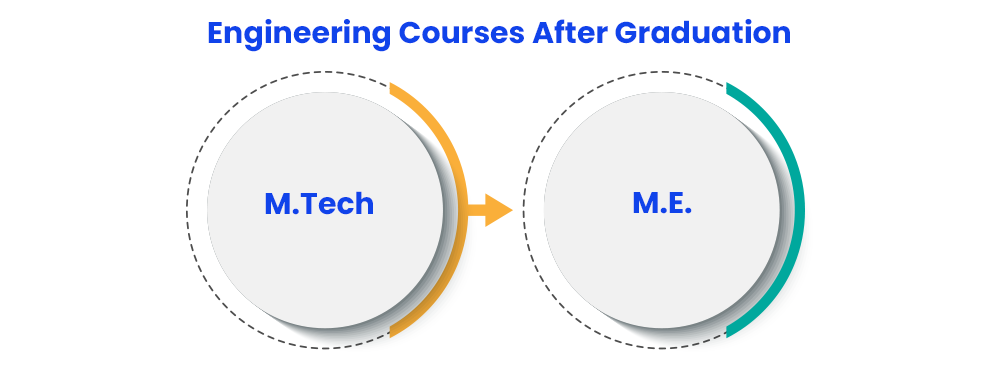
- Master of Technology (M.Tech)- M.Tech is a postgraduate degree in engineering that provides in-depth knowledge of a specific field. The course duration is usually two years, and students can choose from various specialisations such as computer science engineering, electronics and communication engineering, civil engineering, mechanical engineering, and many more. Admission is generally based on the candidate’s performance in the GATE exam or through university-specific entrance exams. However there a program called MTech for Working Professionals for those candidates who don’t have time to attend regular programs. You can enroll to this course without any entrance exams.
- Master of Engineering (M.E.)- ME is another postgraduate degree in engineering that is similar to M.Tech. The course duration is usually two years, and the specialisations offered are similar to M.Tech. Admission is generally based on the candidate’s performance in the GATE exam or through university-specific entrance exams.
Popular Specialisations M.Tech
M.Tech is a subject specific program that deals with a particular subject in detail. So there are several specialisations for every branch of engineering. Following are some of the most popular M.Tech specialisations.
Engineering Courses After 10th
If you wish to pursue an engineering course immediately after 10th standard, then you can not pursue a bachelor’s level course because the minimum eligibility for it is a pass certificate in class 12th. However, you can pursue a diploma or polytechnic course in engineering. These courses generally have a duration of 3 years and are offered by various polytechnic institutes across the country.
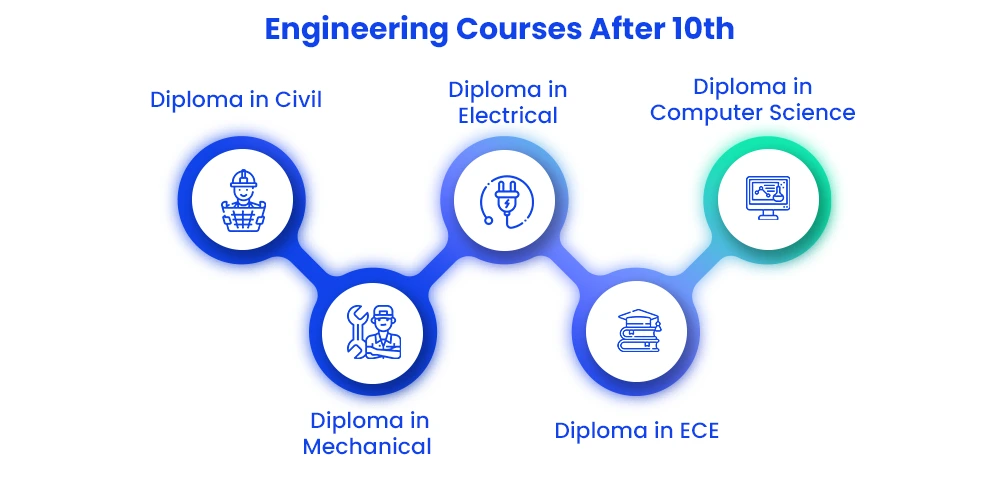
Some of the popular diploma courses in engineering that you can pursue after 10th standard are:
- Diploma in Civil Engineering
- Diploma in Mechanical Engineering
- Diploma in Electrical Engineering
- Diploma in Electronics and Communication Engineering
- Diploma in Computer Science and Engineering
These courses will equip you with the necessary skills and knowledge to work as a technician or junior engineer in the relevant field. After completing the diploma course, you can also pursue higher education such as a degree in engineering through lateral entry.
Best Engineering Colleges In India (NIRF Ranking Based)
Engineering is one of the most pursued undergraduate courses in India. The country owns several renowned and recognized engineering institutions. Based on the latest NIRF (National Institutional Ranking Framework) rankings, here are the top 20 engineering colleges in India.
|
College Name |
NIRF Ranking |
|
Indian Institute of Technology (IIT) Madras |
1 |
|
Indian Institute of Technology (IIT) Delhi |
2 |
|
Indian Institute of Technology (IIT) Bombay |
3 |
|
Indian Institute of Technology (IIT) Kanpur |
4 |
|
Indian Institute of Technology (IIT) Kharagpur |
5 |
|
Indian Institute of Technology (IIT) Roorkee |
6 |
|
Indian Institute of Technology (IIT) Guwahati |
7 |
|
Indian Institute of Technology (IIT) Hyderabad |
8 |
|
National Institute of Technology (NIT) Tiruchirappalli |
9 |
|
Indian Institute of Technology BHU Varanasi |
10 |
|
Vellore Institute of Technology (VIT) |
11 |
|
Jadavpur University |
12 |
|
S.R.M. Institute of Science and Technology |
13 |
|
Anna University |
14 |
|
Indian Institute of Technology (IIT) (Indian School of Mines) |
15 |
|
Indian Institute of Technology (IIT) Indore |
16 |
|
National Institute of Technology Karnataka, Surathkal |
17 |
|
Institute of Chemical Technology |
18 |
|
National Institute of Technology (NIT) Rourkela |
19 |
| Birla Institute of Technology and Science, Pilani |
20 |
Best Engineering Colleges Delhi NCR
New Delhi being the national capital is a hub for higher education in India. Students from all over the country move to Delhi NCR to pursue higher studies. Following are the top 10 engineering colleges in Delhi NCR:
- Indian Institute of Technology (IIT), Delhi
- Delhi Technological University (DTU), Delhi
- National Institute of Technology (NIT), Delhi
- Netaji Subhas University of Technology (NSUT), Delhi
- Indraprastha Institute of Information Technology (IIIT), Delhi
- Jamia Millia Islamia, New Delhi
- Jaypee Institute of Information Technology (JIIT), Noida
- Manav Rachna International Institute of Research and Studies, Faridabad
- Guru Gobind Singh Indraprastha University (GGSIPU), Delhi
- University School of Information, Communication and Technology (USICT), Delhi
Best Engineering Colleges Noida
There are several good engineering colleges in Noida that offer undergraduate and postgraduate programs in various branches of engineering such as computer science, electronics and communication, mechanical engineering, civil engineering, and more. Some of the well-known engineering colleges in Noida are:
- Jaypee Institute of Information Technology (JIIT)
- Amity University
- Galgotias University
- Shiv Nadar University
- Noida Institute of Engineering and Technology (NIET)
- JSS Academy of Technical Education
- Dronacharya Group of Institutions
- GL Bajaj Institute of Technology and Management
Best Engineering Colleges Bengaluru
Bengaluru, also known as the Silicon Valley of India, is home to several renowned engineering colleges in India. Some of the best engineering colleges in Bengaluru include:
- Indian Institute of Science (IISc)
- International Institute of Information Technology (IIITB)
- Indian Institute of Technology (IIT) Bangalore
- BMS College of Engineering
- RV College of Engineering
- PES University
- MS Ramaiah Institute of Technology
- Bangalore Institute of Technology
- Dayananda Sagar College of Engineering
- Christ University Faculty of Engineering
Entrance Engineering Exams
The entrance exams held for engineering courses in India are known to be highly competitive and challenging. These exams test the students’ knowledge and understanding of subjects such as Mathematics, Physics, Chemistry, and sometimes General Aptitude.
The exams are designed to assess a student’s problem-solving skills, analytical abilities, and time-management skills. The questions in these exams are usually multiple-choice questions and require a student to solve complex problems within a stipulated time frame.
The level of difficulty of these exams varies depending on the exam and the college or university for which the exam is conducted. Some exams like JEE Main and JEE Advanced are considered to be among the toughest entrance exams in the world.
However, these entrance exams are also known for their transparency and fairness. They are conducted by national-level testing agencies and are based on a standardised syllabus, which makes the evaluation process impartial and unbiased.
In summary, the entrance exams held for engineering courses in India are highly competitive and challenging, but they also provide a fair and transparent platform for selecting the most deserving candidates for admission to engineering colleges and universities.
Engineering Exams After 12th
There are several entrance exams for admission to undergraduate engineering courses in India. Some of the most popular ones are:
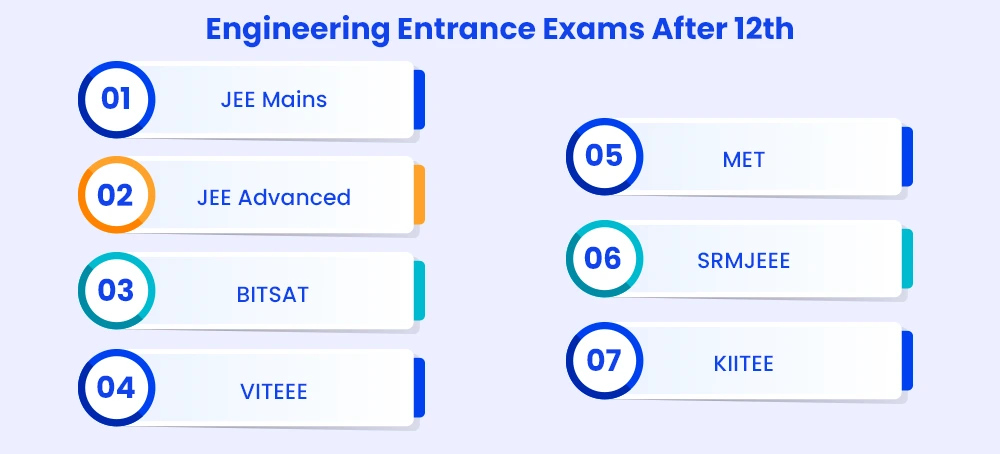
- Joint Entrance Examination (JEE) Main: Conducted by the National Testing Agency (NTA), JEE Main is the most popular engineering entrance exam in India. It is the qualifying exam for admission to undergraduate engineering courses in IITs, NITs, IIITs, and other centrally funded technical institutions.
- JEE Advanced: JEE Advanced is conducted by one of the IITs for admission to undergraduate engineering courses in the 23 IITs in India.
- BITS Admission Test (BITSAT): Conducted by the Birla Institute of Technology and Science (BITS), BITSAT is a computer-based test for admission to undergraduate engineering courses in BITS campuses in Pilani, Goa, and Hyderabad.
- Vellore Institute of Technology Engineering Entrance Exam (VITEEE): Conducted by VIT University, VITEEE is a computer-based test for admission to undergraduate engineering courses in VIT campuses in Vellore, Chennai, Bhopal, and Amravati.
- Manipal Entrance Test (MET): Conducted by Manipal Academy of Higher Education (MAHE), MET is a computer-based test for admission to undergraduate engineering courses in MAHE campuses in Manipal, Jaipur, and Sikkim.
- SRM Joint Engineering Entrance Examination (SRMJEEE): Conducted by SRM Institute of Science and Technology, SRMJEEE is a computer-based test for admission to undergraduate engineering courses in SRM campuses in Chennai, Amravati, Sonepat, and Delhi NCR.
- Kalinga Institute of Industrial Technology Entrance Examination (KIITEE): Conducted by Kalinga Institute of Industrial Technology (KIIT), KIITEE is a computer-based test for admission to undergraduate engineering courses in KIIT campuses in Bhubaneswar.
These are some of the popular entrance exams for admission to undergraduate engineering courses in India. However, there are several other state-level and university-level engineering entrance exams as well.
Engineering Exams After B.Tech
If you have completed your B.Tech degree or some other undergraduate engineering course and are now looking for admission to a master’s degree level engineering program, then there are several entrance exams for admission to postgraduate engineering courses in India. Some of the most popular ones are:
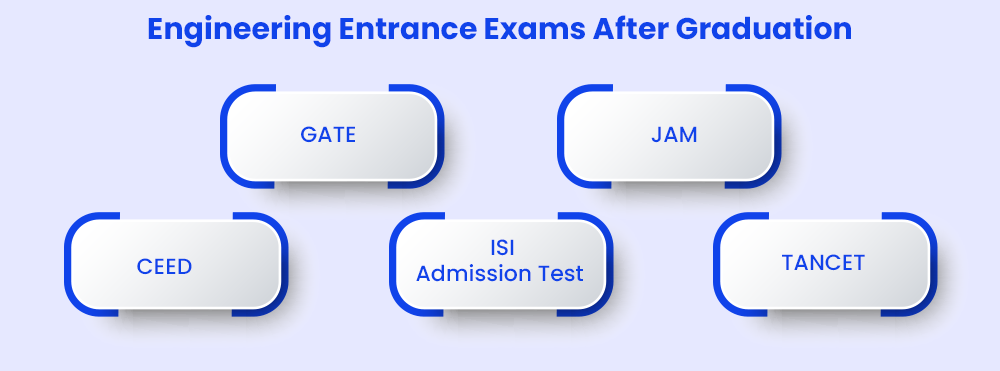
- Graduate Aptitude Test in Engineering (GATE): Conducted by one of the IITs, GATE is a national-level exam for admission to postgraduate engineering courses in IITs, NITs, and other universities in India. It is also used as a qualifying exam for several PSU jobs and for admission to PhD programs.
- Joint Admission Test for M.Sc (JAM): Conducted by the Indian Institute of Science (IISc) and other IITs, JAM is a national-level exam for admission to postgraduate courses in Science and Technology, including engineering.
- Common Entrance Examination for Design (CEED): Conducted by IIT Bombay, CEED is a national-level exam for admission to postgraduate courses in design, including industrial design, communication design, and animation.
- Indian Statistical Institute Admission Test (ISI Admission Test): Conducted by the Indian Statistical Institute (ISI), the ISI Admission Test is a national-level exam for admission to postgraduate courses in statistics, mathematics, and engineering.
- Tamil Nadu Common Entrance Test (TANCET): Conducted by Anna University, TANCET is a state-level exam for admission to postgraduate courses in engineering, management, and other fields in Tamil Nadu.
These are just some of the popular entrance exams for admission to postgraduate engineering courses in India. However, there are several other state-level and university-level entrance exams as well.
Engineering Courses Duration
There are different types and levels of engineering courses taught in India. All of them have different duration. This duration of different types of engineering courses in India varies depending on the program and the university. However, the following are the general durations of some common engineering courses:
|
Course |
Duration |
|
Diploma in Engineering |
3 years |
|
Bachelor of Science (B.Sc) in Engineering |
3 years |
|
Bachelor of Technology (B.Tech) |
4 years |
|
Bachelor of Engineering (BE) |
4 years |
|
Master of Science (M.Sc) Engineering |
2 years |
|
Master of Technology (M.Tech) |
2 years |
|
Master of Engineering (ME) |
2 years |
It is important to note that some universities may have variations in the duration of their engineering programs. Therefore, it is always recommended to check the official website of the concerned university for the exact duration of the program.
Engineering Courses Fee
The total fees for different types of engineering courses in India can vary significantly depending on factors such as the type of institution, location, and course duration.
Here is a rough estimate of the average total fees for some of the most popular engineering courses in India:
- Diploma in Engineering- The average total fees for a three-year Diploma in Engineering program in India can range from INR 30,000 to 1.5 lakhs.
- Bachelor of Technology (B.Tech)- the average total fees for a four-year B.Tech program in a top engineering college in India can range from INR 4-10 lakhs.
- Bachelor of Engineering (BE)- The average total fees for a four-year BE program in an engineering college in India can range from INR 2-6 lakhs.
- Master of Technology (M.Tech)- The average total fees for a two-year M.Tech program in a reputed engineering college in India can range from INR 2-6 lakhs.
It is important to note that these estimates are just averages, and the actual fees can vary depending on the institute, course duration, and other factors. Additionally, fees for private engineering colleges in India can be significantly higher than government colleges.
In-Demand Engineering Courses Specialisations
The engineering courses for working professionals come in several specialisations as these are industry-specific courses. Following are some of the top specialisations of both B.Tech for working professionals and M.Tech for working professionals.
- B.Tech for Working Professionals in Computer Science Engineering
- B.Tech for Working Professionals in Mechanical Engineering
- B.Tech for Working Professionals in Civil Engineering
- B.Tech for Working Professionals in Electronics and Communication Engineering
- B.Tech for Working Professionals in Electrical Engineering
- B.Tech for Working Professionals in Mechanical and Automobile Engineering
- M.Tech for Working Professionals in Computer Science Engineering
- M.Tech for Working Professionals in Mechanical Engineering
- M.Tech for Working Professionals in Civil Engineering
- M.Tech for Working Professionals in Civil Structural Engineering
- M.Tech for Working Professionals in Electronics and Communication Engineering
- M.Tech for Working Professionals in Electrical Power System Engineering
- M.Tech for Working Professionals in Mechanical Production Engineering
- M.Tech for Working Professionals in Environmental Engineering
- M.Tech for Working Professionals in Electronics VLSI Engineering
- M.Tech for Working Professionals in Civil Highway Engineering
- M.Tech for Working Professionals in Power Electronics Engineering
Engineering Courses for Working Professionals
India has a number of institutions that offer online engineering courses in part-time mode. These courses are designed to provide students with the opportunity to earn an engineering degree or diploma without having to attend a traditional classroom setting due to work or other commitments.
However, the government does not allow regular students to pursue engineering courses in online mode as these are technical courses and need practical learning which is difficult with online learning. So, for whom are these online engineering courses for.
So, these part-time online engineering courses are for working professionals. According to the scheme of Work Integrated Learning Program (WILP) people who could not complete their desired higher education because of their jobs can now do so without having to quit their jobs.
So people working in a particular industry with relevant educational qualifications can pursue an engineering course in the same field in a part-time mode without leaving their jobs. WILP programs combine theoretical knowledge with practical work experience. This upskilling helps both the employer and the employee grow better.
WILP programs are designed to give students hands-on experience in their field of study, and help them develop the practical skills and knowledge that they will need to succeed in the workforce. WILP engineering programs are often offered by universities and colleges in partnership with companies in the industry, and may include a mix of online and in-person coursework.
Overall, WILP engineering programs can be a great way for students to gain valuable real-world experience, build their professional network, and increase their chances of accelerating their career growth by finding a better job.
Top Colleges for Online Engineering Courses (WILP)
Some of the well-known institutions that offer WILP engineering courses in India are:

- Birla Institute of Technology and Science (BITS) Pilani
- Lingaya’s Vidyapeeth
- Shri Venkateshwara University (SVU WILP)
- Apex University
Birla Institute of Technology and Science (BITS) Pilani
BITS Pilani is a private deemed university located in Pilani, Rajasthan. It was established in 1964 and has since grown to become one of the most prestigious institutions in the country offering undergraduate, postgraduate, and doctoral programs in a wide range of disciplines.
BITS is widely known for its WILP online programs that are offered in collaboration with various industries, designed to provide working professionals with the opportunity to enhance their knowledge and skills in their respective fields while continuing to work. These programs are flexible and modular and the curriculum is designed to be industry-relevant and is taught by experienced faculty members and industry experts. The programs typically include a mix of online lectures, assignments, quizzes, and exams.
Lingaya’s Vidyapeeth
Lingaya’s Vidyapeeth Engineering is a private university located in Faridabad, Haryana. It was established in 2009 and is named after Late Shri Gadde Lingaya, a philanthropist and educationist. The university is recognised by the University Grants Commission (UGC) and is accredited by the National Assessment and Accreditation Council (NAAC) with an ‘A’ grade.
Through its School of Continuing Education, Lingaya’s Vidyapeeth offers B.Tech and M.Tech for working professionals programs. These programs are designed for working professionals who want to pursue a degree in engineering while continuing with their jobs. The programs are offered in various specialisations.
The classes are conducted in the evenings or on weekends and holidays. The university also provides flexible learning options and personalised support to its students to help them balance their work and studies effectively. We are sharing the list of engineering courses offered by Lingays Vidyapeeth.
|
Engineering Course Name |
Fees Structure |
|
B.Tech In Civil Engineering |
(44000+2500) INR Per Semester+ INR 3500/- One Time |
|
B.Tech In Computer Science Engineering |
(44000+2500) INR Per Semester+ INR 3500/- One Time |
|
B.Tech In Mechanical engineering |
(44000+2500) INR Per Semester+ INR 3500/- One Time |
|
B.Tech In Mechanical Automobile Engineering |
(44000+2500) INR Per Semester+ INR 3500/- One Time |
|
B.Tech In Electronics and Communication Engineering |
(44000+2500) INR Per Semester+ INR 3500/- One Time |
|
M.Tech In Civil Engineering |
(44000+2500) INR Per Semester+ INR 3500/- One Time |
|
M.Tech In Mechanical Engineering |
(44000+2500) INR Per Semester+ INR 3500/- One Time |
|
M.Tech In Computer Science Engineering |
(44000+2500) INR Per Semester+ INR 3500/- One Time |
|
M.Tech In ECE Engineering |
(44000+2500) INR Per Semester+ INR 3500/- One Time |
Shri Venkateshwara University (SVU WILP)
Shri Venkateshwara University (SVU) is a public university located in Tirupati, Andhra Pradesh which was established in 1954. The university has a reputation for academic excellence and has been accredited with an ‘A’ grade by NAAC. SVU has a strong focus on research and innovation and has several research centres in fields like science, technology, social sciences, and management. The university has collaborations with various national and international institutions, enabling students and faculty to engage in exchange programs, joint research projects, and academic collaborations.
The WILP programs offered by SVU are in collaboration with several industries and organisations. They are designed to provide higher education opportunities to working professionals who want to enhance their skills and knowledge while continuing to work. The programs follow a flexible learning model with the help of online mode of learning, allowing students to pursue their studies at their own pace and convenience.
The university offers both B.Tech and M.tech for working professionals in several specialisations. These programs also provide industry-relevant curriculum, hands-on experience, and exposure to the latest tools and technologies to help students acquire practical skills that are in high demand in the job market.
|
Engineering Course Name |
Fees Structure |
|
B.Tech In Civil Engineering |
INR 36000 Per Semester |
|
B.Tech In Computer Science Engineering |
INR 36000 Per Semester |
|
B.Tech In Mechanical engineering |
INR 36000 Per Semester |
|
B.Tech In Electrical Engineering |
INR 36000 Per Semester |
|
B.Tech In Electronics and Communication Engineering |
INR 36000 Per Semester |
|
M.Tech Civil Highway Engineering |
INR 36000 Per Semester |
|
M.Tech Civil Environmental Engineering |
INR 36000 Per Semester |
|
M.Tech Civil Structural Engineering |
INR 36000 Per Semester |
|
M.Tech In Mechanical Engineering |
INR 36000 Per Semester |
|
M.Tech Mechanical In Production Engineering |
INR 36000 Per Semester |
|
M.Tech In Computer Science Engineering |
INR 36000 Per Semester |
|
M.Tech In ECE Engineering |
INR 36000 Per Semester |
|
M.Tech ECE VLSI Engineering |
INR 36000 Per Semester |
|
M.Tech Electrical In Power System |
INR 36000 Per Semester |
|
M.Tech Electrical In Power Electronics |
INR 36000 Per Semester |
Apex University
Apex University is a private university located in Jaipur, Rajasthan. It was established in 2018 and is recognised by the University Grants Commission (UGC). The university offers undergraduate, postgraduate, and doctoral programs in various fields, including engineering, management, commerce, law, design, and agriculture.
Through its School of Engineering and Technology, the Apex University offers B.Tech and M.Tech for working professionals programs in several specialisations. The programs are designed to cater to the needs of working professionals who wish to pursue a higher engineering degree while continuing with their jobs.
The program is delivered through a blended learning model, which combines online lectures, live interactive sessions, and in-person classes on weekends. This allows students to balance their work and study commitments effectively. The programs are designed in a way to provide students with advanced knowledge and skills in their chosen specialisation and prepare them for leadership roles in the industry or academia. We are sharing the list of engineering courses offered by Apex University.
|
Engineering Course Name |
Fees Structure |
|
B.Tech In Civil Engineering |
INR 75,000/- Yearly |
|
B.Tech In Computer Science Engineering |
1,20,000/- Yearly |
|
B.Tech In Mechanical engineering |
INR 75,000/- Yearly |
|
B.Tech In Electronics and Communication Engineering |
INR 75,000/- Yearly |
|
M.Tech In Computer Science Engineering |
(44000+2500) INR Per Semester+ INR 3500/- One Time |
|
M.Tech Power System Engineering |
INR 75,000/- Yearly |
|
M.Tech Thermal Engineering |
INR 75,000/- Yearly |
|
M.Tech Structural Engineering |
INR 75,000/- Yearly |
|
M.Tech Environmental Engineering |
INR 75,000/- Yearly |
Career after Engineering
The career prospects after engineering can be quite good, as engineers are in high demand in many industries. Engineers are involved in the design, development, testing, and implementation of a wide range of products, systems, and technologies, from computer software and hardware to buildings, bridges, and transportation systems.
Benefits of a Career in Engineering:
A career in engineering can be a rewarding and lucrative choice, provided that you have the necessary skills, education, and experience to succeed. Some of the benefits of a career in engineering include:
- High Demand- Engineers are in high demand across many industries, including manufacturing, construction, energy, healthcare, and technology.
- Good Salary- Engineering is one of the highest-paying professions, with entry-level salaries that are typically higher than other fields.
- Variety of career paths- There are many different career paths within engineering, from mechanical and electrical engineering to software and civil engineering.
- Opportunity for creativity- Engineering is a field that requires creativity and innovation as engineers are tasked with developing new solutions to complex problems.
Salary After Engineering
The salary that an engineer can expect varies depending on various factors such as the field of engineering, the level of education, experience, and the company or industry one is working in. However, in general, a fresh graduate engineer in India can expect a starting salary ranging from INR 3-6 lakhs per annum.
With experience, skills, and expertise, an engineer can expect a higher salary. In some specialised fields such as artificial intelligence, data science, and machine learning, the starting salary can be much higher than the average. This is why many professionals already working in the field are opting for online courses in these specific domains to upskill themselves according to the demands of the current industry.
For your reference, the following table lists some of the top job roles in engineering and their respective average annual salaries.
|
Job Role |
Average Annual Salary |
|
Software Engineer |
INR 6,50,000/- |
|
Civil Engineer |
INR 3,50,000/- |
|
Mechanical Engineer |
INR 4,00,000/- |
|
Electrical Engineer |
INR 4,00,000/- |
|
Electronics Engineer |
INR 4,50,000/- |
Top Trending Articles
| Courses After Polytechnic | SGPA and CGPA Explained |
| Experience Letter Format | How to Become A Graphic Designer |
FAQs (Frequently Asked Questions)
The different types of engineering courses include certificate courses in engineering, diploma in engineering, undergraduate courses like B.Sc, BE, B.Tech, postgraduate courses like M.Sc, ME, and M.Tech.
There are several engineering institutions in India and many of them are among the best ones. All the IITs, NITs, BITS Pilani, DTU Delhi, and VIT Vellore are among these top engineering colleges in India.
After completing your 10th standard, you are only eligible to pursue diploma courses in engineering.
No, Mathematics is a compulsory subject if you wish to pursue any engineering course.
No, since the UGC-DEB has not granted approval to provision of an engineering degree in the online mode, you cannot pursue any engineering degree in the online mode. However, there are B.Tech and M.Tech courses with flexible timings in which a few of the lectures are conducted in the online mode.
The exact course fee for a B.Tech varies from one institution to another as well as with the specialisation of engineering one chooses. On an average, the fee for a 4-year B.Tech ranges from INR 4 to INR 10 lakhs. The course fee for a B.Tech with Flexible Timings ranges from INR 1 lakh to INR 2.5 lakhs.

Idea Alchemist / Concept Creator / Insight Generator
We are an online education platform where users can compare 100+ online universities on 30+ X-factors in just 2 minutes. With an active CV community, we have transformed online learning to quite an extent. With the CV Subsidy scheme, we contributing to GER in India while helping our learners with their finances in their “Chuno Apna Sahi” journey!
Every query is essential.
Our team of experts, or experienced individuals, will answer it within 24 hours.
Recommended for you
Tired of dealing with call centers!
Get a professional advisor for Career!
LIFETIME FREE
Rs.1499(Exclusive offer for today)

Pooja
MBA 7 yrs exp

Sarthak
M.Com 4 yrs exp

Kapil Gupta
MCA 5 yrs exp
or



Career Finder
(Career Suitability Test)
Explore and Find out your Most Suitable Career Path. Get Started with our Career Finder Tool Now!
ROI Calculator
Find out the expected salary, costs, and ROI of your chosen online university with our free calculator.

